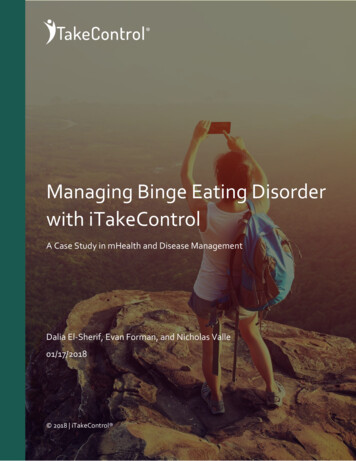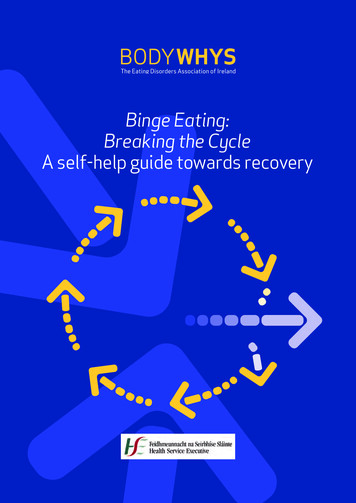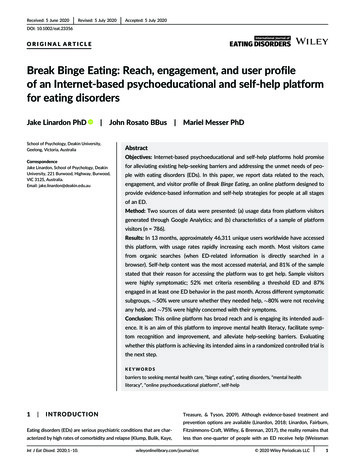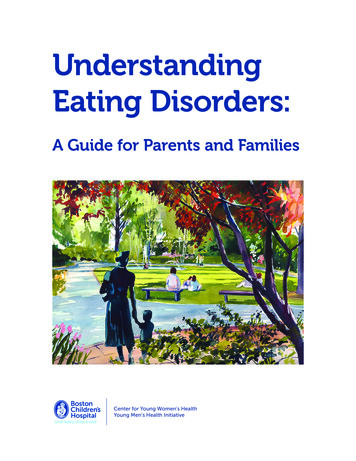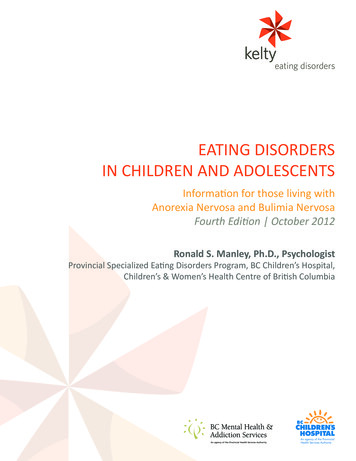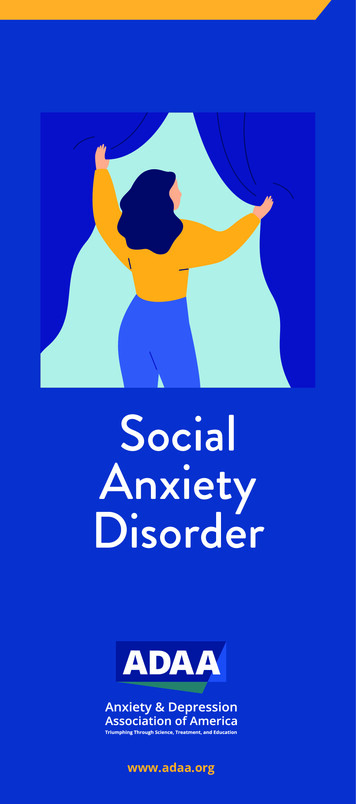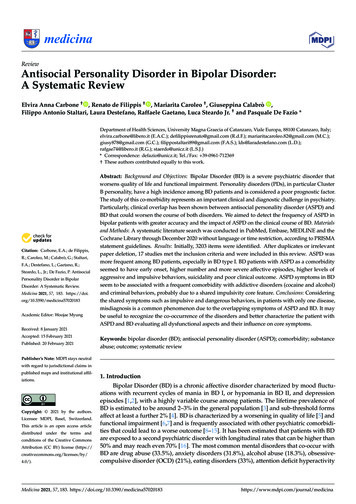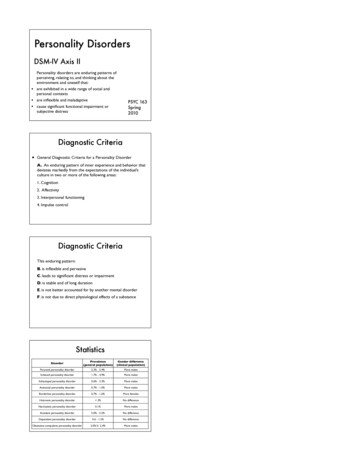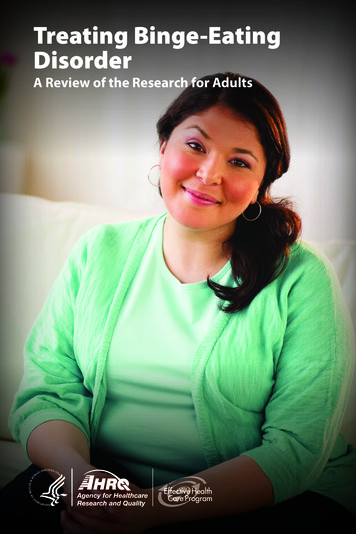
Transcription
Treating Binge-EatingDisorderA Review of the Research for Adultse
Is This Information Right for Me?This information is right for you if:Your health care professional* said you have binge-eatingdisorder (BED). You are age 18 or older. The information in this summary isfrom research on adults. What will this summary tell me?This summary will answer these questions:What is BED? How is BED treated?»»Talk therapy (talking with a trained therapist)»»Medicines What have researchers found about how well talk therapy andmedicines work to treat BED? What are possible side effects of medicines to treat BED? What should I discuss with my health care professional? * Your health care professional may include your primary care physician, nursepractitioner, physician assistant, psychiatrist, psychologist, licensed socialworker-counselor, nutritionist, or dietitian.
Where does the information come from?Researchers funded by the Agency for HealthcareResearch and Quality, a Federal Governmentresearch agency, reviewed studies ontreatments for binge-eating disorderpublished through January 2015. Thereport included 57 studies and onesystematic review and was reviewedby health care professionals,researchers, experts, and the public.You can read the report sorder.1
Understanding Your ConditionWhat is binge-eating disorder?Binge-eating disorder (BED) is acondition in which a person often eatsa much larger amount of food at onetime than is normal. The person feelsout of control while binge eating.BED is not the same as overeatingevery once in a while. People withBED binge eat at least once a week forat least 3 months.A person with BED experiences atleast three of the following during abinge-eating episode:Note: Unlike peoplewith some other eatingdisorders, people withBED generally do nottry to make up for bingeeating with fasting (noteating), excessive exercise,or purging. Purging mayinclude throwing up, overusing laxatives (medicinesthat produce bowelmovements), or takingwater pills.Eating much more quicklythan normal Eating until uncomfortably full Eating a lot of food when not hungry Eating alone because of embarrassment Feeling disgusted, depressed, or guilty after binge eating BED can range from mild to severe. People with BED are oftenoverweight or obese (weighing more than what is consideredhealthy for your height). They are often ashamed of their bingeeating and may try to hide the problem.2
What health problems may be related to BED?People with BED may have: Stress Overweight/obesity Trouble sleeping Digestive problems Depression Headaches Problems with the menstrual cycle Joint pain(monthly period) in women Muscle painHow common is BED?BED is the most common eating disorder in the United States.Out of every 100 women in the United States, a little more than3 women will have BED in their lifetime. Out of every 100 men in the United States, about 2 men willhave BED in their lifetime. 3
Understanding Your OptionsHow is BED treated?Treatment for BED usually includes talk therapy (talking with aspecially trained therapist about your mood, feelings, thoughts,and behaviors). Your health care professional may also suggest amedicine for your BED in addition to talk therapy. The treatmentyour health care professional recommends may depend on otherhealth conditions you have.Talk Therapy To Treat BEDTypes of Talk TherapyCognitiveBehavioralTherapy (CBT) This type of therapy helps you understand how negative thoughts and behaviors canlead to binge eating. The therapist can help you learn how to change your negative thinking and behaviors. CBT usually involves meeting with a therapist one-on-one or in a group. CBT self-help books are available.DialecticalBehavioralTherapy (DBT) This type of therapy helps you understand how negative feelings can lead to binge eating. The therapist helps you learn skills to become more mindful (focused on the presentmoment), to better control your emotions, and to cope better with distress. DBT usually involves meeting with a therapist one-on-one or in a group.InterpersonalPsychotherapy(IPT) This type of therapy helps you understand how problems in the way you interact withothers can cause negative feelings that may lead to binge eating. The therapist can help you learn how to cope better with these negative feelings. The therapist can help you learn skills to improve the way you interact with others. IPT usually involves meeting with a therapist one-on-one or in a group.4
What have researchers found about talk therapy for BED? Researchers found that cognitive behavioral therapy (CBT) witha therapist helps improve BED.Does CBT with a therapist help people with BED:What Researchers Found:Stop binge eating?YesBinge eat less often?YesHave fewer eating-related thoughts and urges?YesHave fewer symptoms of depression?No More research is needed to know how well other promisingtypes of talk therapy, including dialectical behavioral therapyand interpersonal psychotherapy, work to treat BED.What about behavioral weight-loss therapy?This type of therapy helps you develop behaviors to lose weight,such as following a nutrition plan and doing more physical activity. Researchers found that although it may help you lose weight,behavioral weight-loss therapy alone does not clearly help bingeeating behaviors. 5
Medicines To Treat BEDMedicine(Brand Name)*About the MedicineHow the Medicine WorksLisdexamfetamine This is the first medicine approved by the U.S. Food It works by changing the amount(Vyvanse )and Drug Administration (FDA) to treat BED.of certain chemicals in the brain.Topiramate(Topamax ,Trokendi XR ,Qudexy XR)Second-generationantidepressants It is a stimulant and is also used to treat attentiondeficit hyperactivity disorder (ADHD). This medicine was made to treat seizures and It helps rebalance chemicals inprevent migraine headaches.the brain and helps correct theelectrical activity of brain cells. It is now used to treat many different conditions. These medicines were made to treat depression,but they are also used to treat other conditions. Examples of second-generation antidepressantsinclude bupropion (Wellbutrin ), citalopram(Celexa ), duloxetine (Cymbalta ), escitalopram(Lexapro ), fluoxetine (Prozac ), fluvoxamine(Luvox ), and sertraline (Zoloft ). These medicines help improvethe way your brain uses certainchemicals that control mood,stress, and appetite.* Some of these medicines come in a generic from. The generic form may be cheaper.What have researchers found about medicines for BED?Researchers found that lisdexamfetamine (Vyvanse ), topiramate(Topamax , Trokendi XR , Qudexy XR), and second-generationantidepressants help improve BED in the short term (when takenfor 6 to 16 weeks). More research is needed to know how well these medicines workto treat BED in the long term. Does the medicine helppeople with BED:Stop binge eating?Binge eat less often?Have fewer eating-relatedthoughts and urges?Lose weight?Act less impulsively and haveless disruptions to social life?Lisdexamfetamine(Vyvanse )Topiramate (Topamax ,Trokendi XR , Qudexy YesYesYesYesYesYesNo*Not reportedYes*Not reported*More research is needed to know this for sure.6
What are possible side effects of the medicines?Below are possible side effects listed by the FDA. Just because aside effect is possible does not mean you will have it.Lisdexamfetamine (Vyvanse ) Dry mouth Increased heart rate Trouble falling or staying asleep Constipation Decreased appetite Feeling jittery Anxiety HeadacheWarning: The FDA warns that lisdexamfetamine (Vyvanse ) has a risk of abuse (taking more of themedicine than your health care professional has prescribed) and dependence (feeling like you have to takethe medicine and cannot stop).The FDA also warns that lisdexamfetamine (Vyvanse ) can cause sudden death, stroke, or heart attack insome people, but these side effects are rare. People with heart problems should talk with their health careprofessional before taking this medicine.Pregnant women should also talk with their health care professional before taking this medicine.Topiramate (Topamax , Trokendi XR , Qudexy XR) Numbness or tingling (usually in Nervousnessthe arms, hands, feet, or legs) Slowing of movement and Decreased appetitespeech or other speech problems Weight loss Vision problems Nausea Fever Tiredness or drowsiness Memory problems Dizziness Diarrhea Changes in the tasteof food Upper respiratory tractinfection Pain in the belly Reduced sense of touchWarning: The FDA warns that if topiramate (Topamax , Trokendi XR , Qudexy XR) is taken during pregnancy,it can cause the unborn baby to have a cleft palate or a cleft lip (the roof of the mouth or the lip is split).Second-generation antidepressants Nausea and vomiting Sexual problems (such as low sex Increase or decreasein appetitedrive or problems ejaculating) Sweating Dry mouth Feeling weak Trouble falling asleep orstaying asleep Tremor (shaking that you A rashcannot control)Note: The side effects listed here are common side effects of second-generation antidepressants. Eachsecond-generation antidepressant may have slightly different side effects.Warning: The FDA warns that second-generation antidepressants may cause thoughts of suicide orsuicidal behavior in young adults (up to age 24). If you ever have thoughts of harming yourself, call yourhealth care professional right away.The National Suicide Prevention Lifeline is available at 1-800-273-TALK (8255), or go towww.suicidepreventionlifeline.org.Pregnant women should talk with their health care professional before taking a second-generationantidepressant.7
Making a DecisionWhat should I think about when deciding?There are several things to think about when deciding whichtreatment is right for you. You may want to talk with your healthcare professional about: What treatment may be best for you The possible benefits and side effects of the treatment The cost of the treatment What your family and friends can do to support youAsk your health care professional Do you think talk therapy may help me? If so, which type of talktherapy do you think might be best for me? Why? Can you help me find a therapist trained to help people with BED? How often would I need to meet with the therapist? Do you think a medicine may also help? If so, which medicinedo you think might work best for me? How long would I need to take the medicine? What side effects should I watch for? What should I do if I haveany side effects?8
Other questions:Write the answers here:9
SourcesThe information in this summary comes from the reportManagement and Outcomes of Binge-Eating Disorder, December2015. The report was produced by the RTI International–Universityof North Carolina Evidence-based Practice Center through fundingby the Agency for Healthcare Research and Quality (AHRQ).For a copy of the report or for more information about AHRQ,go to rder.Additional information came from the MedlinePlus Web site,a service of the National Library of Medicine and the NationalInstitutes of Health. This site is available at www.medlineplus.gov.Some information also came from the paper, “PsychologicalTreatments for Binge Eating Disorder,” published in the journalCurrent Psychiatry Reports, August 2012.This summary was prepared by the John M. Eisenberg Centerfor Clinical Decisions and Communications Science at BaylorCollege of Medicine, Houston, TX. People with binge-eatingdisorder reviewed this summary.AHRQ Pub. No. 15(16)-EHC030-AMay 2016www.ahrq.gov
What is binge-eating disorder? Binge-eating disorder (BED) is a condition in which a person often eats a much larger amount of food at one time than is normal. The person feels out of control while binge eating. BED is not the same as overeating every once in a while. People with BED binge
